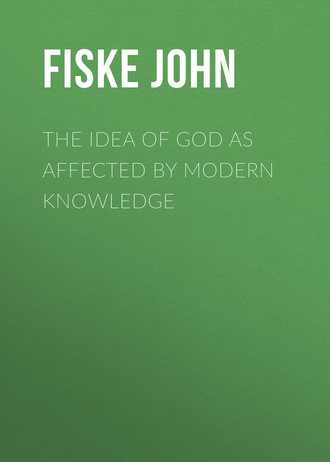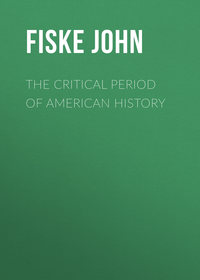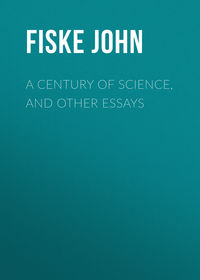 полная версия
полная версияThe Idea of God as Affected by Modern Knowledge
Still further striking confirmation is found in the marvellous disclosures of spectrum analysis. To whatever part of the heavens we turn the telescope, armed with this new addition to our senses, we find the same chemical elements with which the present century has made us familiar upon the surface of the earth. From the distant worlds of Arcturus and the Pleiades, whence the swift ray of light takes many years to reach us, it brings the story of the hydrogen and oxygen, the vapour of iron or sodium, which set it in motion. Thus in all parts of the universe that have fallen within our ken we find a unity of chemical composition. Nebulæ, stars, and planets are all made of the same materials, and on every side we behold them in different stages of development, worlds in the making: here an irregular nebula such as our solar system once was, there a nebula whose rotation has at length wrought it into spheroidal form; here and there stars of varied colours marking different eras in chemical evolution; now planets still partly incandescent like Saturn and Jupiter, then planets like Mars and the earth, with cool atmospheres and solid continents and vast oceans of water; and lastly such bodies as the moon, vapourless, rigid, and cold in death.
Still nearer do we come toward realizing the unity of Nature when we recollect that the law of evolution is not only the same for all these various worlds, but is also the same throughout all other orders of phenomena. Not only in the development of cosmical bodies, including the earth, but also in the development of life upon the earth's surface and in the special development of those complex manifestations of life known as human societies, the most general and fundamental features of the process are the same, so that it has been found possible to express them in a single universal formula. And what is most striking of all, this notable formula, under which Herbert Spencer has succeeded in generalizing the phenomena of universal evolution, was derived from the formula under which Von Baer in 1829 first generalized the mode of development of organisms from their embryos. That a law of evolution first partially detected among the phenomena of the organic world should thereafter not only be found applicable to all other orders of phenomena, but should find in this application its first complete and coherent statement, is a fact of wondrous and startling significance. It means that the universe as a whole is thrilling in every fibre with Life, – not, indeed, life in the usual restricted sense, but life in a general sense. The distinction, once deemed absolute, between the living and the not-living is converted into a relative distinction; and Life as manifested in the organism is seen to be only a specialized form of the Universal Life.
The conception of matter as dead or inert belongs, indeed, to an order of thought that modern knowledge has entirely outgrown. If the study of physics has taught us anything, it is that nowhere in Nature is inertness or quiescence to be found. All is quivering with energy. From particle to particle without cessation the movement passes on, reappearing from moment to moment under myriad Protean forms, while the rearrangements of particles incidental to the movement constitute the qualitative differences among things. Now in the language of physics all motions of matter are manifestations of force, to which we can assign neither beginning nor end. Matter is indestructible, motion is continuous, and beneath both these universal truths lies the fundamental truth that force is persistent. The farthest reach in science that has ever been made was made when it was proved by Herbert Spencer that the law of universal evolution is a necessary consequence of the persistence of force. It has shown us that all the myriad phenomena of the universe, all its weird and subtle changes, in all their minuteness from moment to moment, in all their vastness from age to age, are the manifestations of a single animating principle that is both infinite and eternal.
By what name, then, shall we call this animating principle of the universe, this eternal source of phenomena? Using the ordinary language of physics, we have just been calling it Force, but such a term in no wise enlightens us. Taken by itself it is meaningless; it acquires its meaning only from the relations in which it is used. It is a mere symbol, like the algebraic expression which stands for a curve. Of what, then, is it the symbol?
The words which we use are so enwrapped in atmospheres of subtle associations that they are liable to sway the direction of our thoughts in ways of which we are often unconscious. It is highly desirable that physics should have a word as thoroughly abstract, as utterly emptied of all connotations of personality, as possible, so that it may be used like a mathematical symbol. Such a word is Force. But what we are now dealing with is by no means a scientific abstraction. It is the most concrete and solid of realities, the one Reality which underlies all appearances, and from the presence of which we can never escape. Suppose, then, that we translate our abstract terminology into something that is more concrete. Instead of the force which persists, let us speak of the Power which is always and everywhere manifested in phenomena. Our question, then, becomes, What is this infinite and eternal Power like? What kind of language shall we use in describing it? Can we regard it as in any wise "material," or can we speak of its universal and ceaseless activity as in any wise the working of a "blind necessity"? For here, at length, we have penetrated to the innermost kernel of the problem; and upon the answer must depend our mental attitude toward the mystery of existence.
The answer is that we cannot regard the infinite and eternal Power as in any wise "material," nor can we attribute its workings to "blind necessity." The eternal source of phenomena is the source of what we see and hear and touch; it is the source of what we call matter, but it cannot itself be material. Matter is but the generalized name we give to those modifications which we refer immediately to an unknown something outside of ourselves. It was long ago shown that all the qualities of matter are what the mind makes them, and have no existence as such apart from the mind. In the deepest sense all that we really know is mind, and as Clifford would say, what we call the material universe is simply an imperfect picture in our minds of a real universe of mind-stuff.24 Our own mind we know directly; our neighbour's mind we know by inference; that which is external to both is a Power hidden from sense, which causes states of consciousness that are similar in both. Such states of consciousness we call material qualities, and matter is nothing but the sum of such qualities. To speak of the hidden Power itself as "material" is therefore not merely to state what is untrue, – it is to talk nonsense. We are bound to conceive of the Eternal Reality in terms of the only reality that we know, or else refrain from conceiving it under any form whatever. But the latter alternative is clearly impossible.25 We might as well try to escape from the air in which we breathe as to expel from consciousness the Power which is manifested throughout what we call the material universe. But the only conclusion we can consistently hold is that this is the very same power "which in ourselves wells up under the form of consciousness."
In the nature-worship of primitive men, beneath all the crudities of thought by which it was overlaid and obscured, there was thus after all an essential germ of truth which modern philosophy is constrained to recognize and reiterate. As the unity of Nature has come to be demonstrated, innumerable finite powers, once conceived as psychical and deified, have been generalized into a single infinite Power that is still thought of as psychical. From the crudest polytheism we have thus, by a slow evolution, arrived at pure monotheism, – the recognition of the eternal God indwelling in the universe, in whom we live and move and have our being.
But in thus conceiving of God as psychical, as a Being with whom the human soul in the deepest sense owns kinship, we must beware of too carelessly ascribing to Him those specialized psychical attributes characteristic of humanity, which one and all imply limitation and weakness. We must not forget the warning of the prophet Isaiah: "My thoughts are not your thoughts, neither are your ways my ways, saith the Lord. For as the heavens are higher than the earth, so are my ways higher than your ways, and my thoughts than your thoughts." Omniscience, for example, has been ascribed to God in every system of theism; yet the psychical nature to which all events, past, present, and future, can be always simultaneously present is clearly as far removed from the limited and serial psychical nature of Man as the heavens are higher than the earth. We are not so presumptuous, therefore, as to attempt, with some theologians of the anthropomorphic school, to inquire minutely into the character of the divine decrees and purposes. But our task would be ill-performed were nothing more to be said about that craving after a final cause which we have seen to be an essential element in Man's religious nature. It remains to be shown that there is a reasonableness in the universe, that in the orderly sequence of events there is a meaning which appeals to our human intelligence. Without adopting Paley's method, which has been proved inadequate, we may nevertheless boldly aim at an object like that at which Paley aimed. Caution is needed, since we are dealing with a symbolic conception as to which the very point in question is whether there is any reality that answers to it. The problem is a hard one, but here we suddenly get powerful help from the doctrine of evolution, and especially from that part of it known as the Darwinian theory.
XIV
The Power that makes for RighteousnessAlthough it was the Darwinian theory of natural selection which overthrew the argument from design, yet – as I have argued in another place – when thoroughly understood it will be found to replace as much teleology as it destroys.26 Indeed, the doctrine of evolution, in all its chapters, has a certain teleological aspect, although it does not employ those methods which in the hands of the champions of final causes have been found so misleading. The doctrine of evolution does not regard any given arrangement of things as scientifically explained when it is shown to subserve some good purpose, but it seeks its explanation in such antecedent conditions as may have been competent to bring about the arrangement in question. Nevertheless, the doctrine of evolution is not only perpetually showing us the purposes which the arrangements of Nature subserve, but throughout one large section of the ground which it covers it points to a discernible dramatic tendency, a clearly-marked progress of events toward a mighty goal. Now it especially concerns us to note that this large section is just the one, and the only one, which our powers of imagination are able to compass. The astronomic story of the universe is altogether too vast for us to comprehend in such wise as to tell whether it shows any dramatic tendency or not.27 But in the story of the evolution of life upon the surface of our earth, where alone we are able to compass the phenomena, we see all things working together, through countless ages of toil and trouble, toward one glorious consummation. It is therefore a fair inference, though a bold one, that if our means of exploration were such that we could compass the story of all the systems of worlds that shine in the spacious firmament, we should be able to detect a similar meaning. At all events, the story which we can decipher is sufficiently impressive and consoling. It clothes our theistic belief with moral significance, reveals the intense and solemn reality of religion, and fills the heart with tidings of great joy.
The glorious consummation toward which organic evolution is tending is the production of the highest and most perfect psychical life. Already the germs of this conclusion existed in the Darwinian theory as originally stated, though men were for a time too busy with other aspects of the theory to pay due attention to them. In the natural selection of such individual peculiarities as conduce to the survival of the species, and in the evolution by this process of higher and higher creatures endowed with capacities for a richer and more varied life, there might have been seen a well-marked dramatic tendency, toward the dénouement of which every one of the myriad little acts of life and death during the entire series of geologic æons was assisting. The whole scheme was teleological, and each single act of natural selection had a teleological meaning. Herein lies the reason why the theory so quickly destroyed that of Paley. It did not merely refute it, but supplanted it with explanations which had the merit of being truly scientific, while at the same time they hit the mark at which natural theology had unsuccessfully aimed.
Such was the case with the Darwinian theory as first announced. But since it has been more fully studied in its application to the genesis of Man, a wonderful flood of light has been thrown upon the meaning of evolution, and there appears a reasonableness in the universe such as had not appeared before. It has been shown that the genesis of Man was due to a change in the direction of the working of natural selection, whereby psychical variations were selected to the neglect of physical variations. It has been shown that one chief result of this change was the lengthening of infancy, whereby Man appeared on the scene as a plastic creature capable of unlimited psychical progress. It has been shown that one chief result of the lengthening of infancy was the origination of the family and of human society endowed with rudimentary moral ideas and moral sentiments. It has been shown that through these coöperating processes the difference between Man and all lower creatures has come to be a difference in kind transcending all other differences; that his appearance upon the earth marked the beginning of the final stage in the process of development, the last act in the great drama of creation; and that all the remaining work of evolution must consist in the perfecting of the creature thus marvellously produced. It has been further shown that the perfecting of Man consists mainly in the ever-increasing predominance of the life of the soul over the life of the body. And lastly, it has been shown that, whereas the earlier stages of human progress have been characterized by a struggle for existence like that through which all lower forms of life have been developed, nevertheless the action of natural selection upon Man is coming to an end, and his future development will be accomplished through the direct adaptation of his wonderfully plastic intelligence to the circumstances in which it is placed. Hence it has appeared that war and all forms of strife, having ceased to discharge their normal function, and having thus become unnecessary, will slowly die out;28 that the feelings and habits adapted to ages of strife will ultimately perish from disuse; and that a stage of civilization will be reached in which human sympathy shall be all in all, and the spirit of Christ shall reign supreme throughout the length and breadth of the earth.
These conclusions, with the grounds upon which they are based, have been succinctly set forth in my little book entitled "The Destiny of Man viewed in the Light of his Origin." Startling as they may have seemed to some, they are no more so than many of the other truths which have been brought home to us during this unprecedented age. They are the fruit of a wide induction from the most vitally important facts which the doctrine of evolution has set forth; and they may fairly claim recognition as an integral body of philosophic doctrine fit to stand the test of time. Here they are summarized as the final step in my argument concerning the true nature of theism. They add new meanings to the idea of God, as it is affected by modern knowledge, while at the same time they do but give articulate voice to time-honoured truths which it was feared the skepticism of our age might have rendered dumb and powerless. For if we express in its most concentrated form the meaning of these conclusions regarding Man's origin and destiny, we find that it affords the full justification of the fundamental ideas and sentiments which have animated religion at all times. We see Man still the crown and glory of the universe and the chief object of divine care, yet still the lame and halting creature, loaded with a brute-inheritance of original sin, whose ultimate salvation is slowly to be achieved through ages of moral discipline. We see the chief agency which produced him – natural selection which always works through strife – ceasing to operate upon him, so that, until human strife shall be brought to an end, there goes on a struggle between his lower and his higher impulses, in which the higher must finally conquer. And in all this we find the strongest imaginable incentive to right living, yet one that is still the same in principle with that set forth by the great Teacher who first brought men to the knowledge of the true God. As to the conception of Deity, in the shape impressed upon it by our modern knowledge, I believe I have now said enough to show that it is no empty formula or metaphysical abstraction which we would seek to substitute for the living God. The infinite and eternal Power that is manifested in every pulsation of the universe is none other than the living God. We may exhaust the resources of metaphysics in debating how far his nature may fitly be expressed in terms applicable to the psychical nature of Man; such vain attempts will only serve to show how we are dealing with a theme that must ever transcend our finite powers of conception. But of some things we may feel sure. Humanity is not a mere local incident in an endless and aimless series of cosmical changes. The events of the universe are not the work of chance, neither are they the outcome of blind necessity. Practically there is a purpose in the world whereof it is our highest duty to learn the lesson, however well or ill we may fare in rendering a scientific account of it. When from the dawn of life we see all things working together toward the evolution of the highest spiritual attributes of Man, we know, however the words may stumble in which we try to say it, that God is in the deepest sense a moral Being. The everlasting source of phenomena is none other than the infinite Power that makes for righteousness. Thou canst not by searching find Him out; yet put thy trust in Him, and against thee the gates of hell shall not prevail; for there is neither wisdom nor understanding nor counsel against the Eternal.
>
NOTES
A. – MEDITATIONS OF A SAVAGEIn the presence of the great mystery of existence, the thoughts of the untutored savage are not always so very unlike those of civilized men, as we may see from the following pathetic words of a Kafir, named Sekese, in conversation with a French traveller, M. Arbrouseille, on the subject of the Christian religion: —
"Your tidings," said this uncultivated barbarian, "are what I want, and I was seeking before I knew you, as you shall hear and judge for yourself. Twelve years ago I went to feed my flocks; the weather was hazy. I sat down upon a rock and asked myself sorrowful questions; yes, sorrowful, because I was unable to answer them. Who has touched the stars with his hands – on what pillars do they rest, I asked myself. The waters never weary, they know no other law than to flow without ceasing from morning till night and from night till morning; but where do they stop, and who makes them flow thus? The clouds also come and go, and burst in water over the earth. Whence come they – who sends them? The diviners certainly do not give us rain; for how could they do it? and why do not I see them with my own eyes when they go up to heaven to fetch it? I cannot see the wind; but what is it? who brings it, makes it blow and roar and terrify us? Do I know how the corn sprouts? Yesterday there was not a blade in my field, to-day I returned to the field and found some; who can have given to the earth the wisdom and the power to produce it? Then I buried my head in both my hands." – Cited in Picton, Mystery of Matter, p. 222.
B. – THE NAME GODNone of the dictionaries offer a satisfactory explanation of the word God. It was once commonly supposed to be related to the adjective good, but Grimm long ago showed that this connection is, to say the least, very improbable. It has also been sought to identify it with Persian Khodâ, from Zend qvadata, Skr. svadata, Lat. a se datus, in which the idea is that of self-existence; but this fanciful etymology was exploded by Aufrecht. The arrant guesswork of Donaldson, who would connect God with καλός, and θεός with τίθημι (New Cratylus, p. 710), scarcely deserves mention in these days. Among the more scientific philologists of our time, August Fick, in treating of the "Wortschatz der germanischen Spracheinheit," simply refers God to a primitive Teutonic gutha, and says no more about it. (Vergl. Woerterbuch der indogermanischen Sprachen, III. 107.) He is followed by Skeat (Etymological Dictionary, p. 238), who adds that there is "no connection with good." Eduard Müller says: "So bedenklich die zusammenstellung mit good, so fraglich ist doch auch noch die urverwandtschaft mit pers. Khodâ gott, oder skr. gûdha mysterium, oder skr. guddha purus; Heyne: 'als sich verhüllender, unsichtbarer, vgl. skr. guh für gudh celare.'" (Woerterbuch der englischen Sprache, p. 456.)
Max Müller has much more plausibly suggested that God was formerly a heathen name for the Deity, which passed into Christian usage, like the Latin Deus. (Science of Language, 6th ed. II. 317.) Following this hint, I suggested, several years ago (North Amer. Review, Oct. 1869, p. 354), that God is probably identical with Wodan or Odin, the name of the great Northern deity, the chief object of the worship of our forefathers. This relation of an initial G to an initial W is a very common one; as for example Guillaume and William, guerre and war, guardian and warden, guile and wile. The same thing is seen in Armorican guasta and Ital. guastare, as compared with Lat. vastare, Eng. waste; and in the Eng. quick, Goth. quivs, Lat. vivus. In Erchempert's Historia Langobardorum, 11, Pertz, III. 245, we find Ludoguicus for Ludovicus. Not only is this relation a common one, but there are plenty of specific instances of it in the case of Wodan. In Germany we have the town names of Godesberg, Gudenberg, and Godensholt, all derived from Wodan. In the Westphalian dialect, Wednesday ("day of Wodan") is called Godenstag or Gunstag; in Nether-Rhenish, Gudenstag; in Flemish, Goenstag. See Thorpe, Northern Mythol. I. 229; Taylor, Words and Places, 323; and cf. Grimm, Gesch. der deutschen Sprache, 296. The Westphalian Saxons wrote both Guodan and Gudan. Odin was also called Godin (Laing, Heimskringla, I. 74), and Paulus Diaconus tells us that the Lombards pronounced Wodan as Guodan. In view of such a convergence of proofs, I am surprised that attention was not long ago called to this etymology.
Wodan was originally the storm-spirit or animating genius of the wind, answering in many respects to the Greek Hermes and the Vedic Sarameyas. See my Myths and Myth-makers, 19, 20, 32, 35, 67, 124, 204; and cf. Mackay, Religious Development of the Greeks and Hebrews, i. 260-273.
1
E. E. 56-77.
2
C. P. i. 230.
3
See note A at the end of the volume.
4
C. P. i. 157, 177-179.
5
M. M. 18-21, et passim.
6
M. M. 220.







